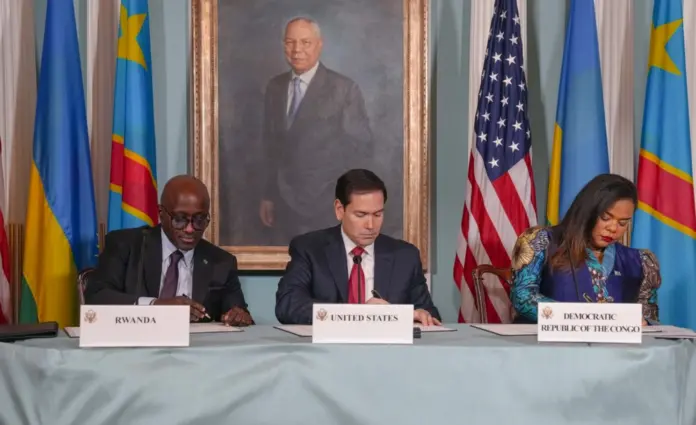It is more than just a ceasefire scribbled under Washington’s watchful eye, the Peace Deal DRC Rwanda is the blunt admission of Kigali’s failed shadow war, an acknowledgment that its hybrid arsenal of disinformation, covert proxies, and moral posturing has run aground.
Beyond the actual front lines, Rwanda opened another battlefield, the digital fog of war. For months, Kigali bet heavily on a sophisticated disinformation campaign: well-oiled social media farms, amplifier accounts on X, encrypted propaganda on WhatsApp and Telegram, all designed to sow doubt, fracture Congolese unity, and tarnish Kinshasa’s fragile credibility abroad. In theory, it was neat; in practice, it hit an immovable wall.
Clarity versus confusion: Kinshasa’s unexpected counterstrike
Where Kigali hoped to flood the infosphere with contradictory narratives, Kinshasa responded with a single, unflinching counterattack: clarity. Spearheaded by Communication Minister Patrick Muyaya, the Congolese narrative was disciplined, educational, almost monotonously structured. And this Peace Deal DRC Rwanda scenario shows how this unlikely strategy bore fruit: the anticipated confusion never materialized.
Instead, Kinshasa’s careful communication won over observers who, from Brussels to Addis Ababa, were tired of the region’s perpetual fog. The lesson is stark, the best antidote to propaganda is consistency.
A failed gamble to fracture Congolese unity
Kigali’s calculus rested on a familiar script: inflame Eastern communities, stir up Banyamulenge tensions, create local militias, and turn the Kivu crisis into a civil implosion. But the bet backfired. Kinshasa’s response was strikingly cohesive, national institutions, local leaders, and civil society all projected the same line: no more divide-and-rule games.
By failing to weaponize ethnic cleavages, Rwanda’s information machine sputtered out. This is the real heart of the Peace Deal DRC Rwanda: an indirect admission that Kigali’s old playbook is no longer enough to fragment its vast neighbor.
Kigali’s strategic isolation, signed in ink
The consequences are anything but symbolic. By signing the Washington agreement and formally pledging to cut all support to the M23, Kigali essentially validates the accusations it has spent years denying. For President Kagame, the signature is a bitter pill: a forced confession that the “war of shadows”, digital, diplomatic, and proxy, has left Rwanda more isolated than ever.
Ironically, the relentless push to control the narrative only made the hidden hand more visible. In saturating the region’s echo chambers with contradictory messages, Kigali lost control of the storyline altogether.
The lesson: In the age of networks, brute force isn’t enough
If this regional imbroglio proves anything, it’s that military pressure and digital sabotage can no longer guarantee victory. Peace Deal DRC Rwanda stands as proof: today, the frontline runs through hashtags, press briefings, and WhatsApp chains as much as it does through the hills of North Kivu.
In the end, Kigali lost not just a few square miles of influence, but its aura as the master manipulator of the Great Lakes region. And in these times of American-brokered deals, every lost shadow war eventually shows up in the harsh daylight.



